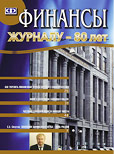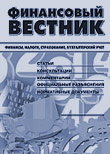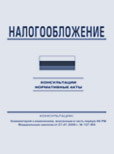Содержание
Финансы и бюджет: проблемы и решения
Л.Л. Игонина, заведующая кафедрой «Экономика и финансы» Краснодарского филиала Финансового университета при Правительстве Российской Федерации, доктор экономических наук, профессор
E-mail: lligonina@fa.ru
В статье приведен анализ динамики и структуры доходов региональных бюджетов в условиях экономической нестабильности, отражены факторы, которые определяли их в кризисной ситуации. Сделан вывод, что основная сумма потерь доходов региональных бюджетов в этих условиях приходится на налог на прибыль организаций. При этом регионы с высоким уровнем экономического и бюджетного потенциала показали снижение налоговых доходов, в отличие от регионов-реципиентов, вышедших в лидеры по их приросту, что в очередной раз свидетельствует о необходимости совершенствования сложившейся модели межбюджетных отношений.
Ключевые слова: консолидированные бюджеты субъектов РФ, анализ доходов региональных бюджетов, структура расходов консолидированных бюджетов субъектов РФ, налог на прибыль организаций, государственный долг субъектов РФ, муниципальный долг.
Е.Г. Князева, проректор по дополнительному образованию и профориентационной работе Уральского государственного экономического университета (г. Екатеринбург), доктор экономических наук, профессор
E-mail: knyazeva_eg@usue.ru
К.Н. Самков, начальник экспертного управления Экспертно-аналитического департамента губернатора Свердловской области и Правительства Свердловской области, соискатель кафедры «Финансы, денежное обращение и кредит» Уральского государственного экономического университета
E-mail: vokmas@yandex.ru
Объектом исследования нашей статьи явились государственные программы на уровне региона, а предметом исследования – методологические подходы к финансированию государственных программ.
В статье отражены проблемы реализации и финансирования региональных государственных программ, подходы к оценке эффективности государственных программ, приведены пути совершенствования финансирования государственных программ.
Ключевые слова:финансирование государственных программ, региональная программа, оценка эффективности государственных программ.
М.В. Казаковцева, доцент кафедры экономики Марийского государственного университета (г. Йошкар-Ола), кандидат экономических наук, доцент
E-mail: marina290576@mail.ru
Мониторинг бюджетных доходов субъектов РФ основывается на системном подходе, который включает совокупность взаимосвязанных элементов: постановку целей и задач, анализ внешней среды, разработку системы показателей, применение современных методов экономико-математического анализа, использование информационных технологий автоматизации сбора, обработки данных и прогнозирования.
Среди направлений мониторинга доходных финансовых потоков в субъектах РФ выделены конкретные мероприятия: оценка эффективности налоговых льгот; совершенствование методов, разработка и проведение эффективных мероприятий налогового администрирования; разработка мероприятий по сокращению объемов теневого сектора экономики; стимулирование развития малого и среднего бизнеса.
Ключевые слова: бюджет субъекта РФ, бюджетные доходы, мониторинг, налоговые и неналоговые бюджетные доходы.
Г.Т. Гафурова, доцент кафедры «Финансы и кредит» Казанского инновационного университета имени В.Г. Тимирясова, кандидат экономических наук
E-mail: gafurova@ieml.ru
Э.Р. Ковалева, доцент кафедры «Финансы и кредит» Казанского инновационного университета имени В.Г. Тимирясова, кандидат экономических наук
E-mail: eva2@list.ru
Поддержка предпринимательства стала одной из ключевых задач Правительства РФ в условиях пандемии. В работе рассматриваются последствия пандемии для малого и среднего предпринимательства, основные механизмы финансовой поддержки со стороны государства, а также финансовые последствия для федерального бюджета.
Ключевые слова: государственная поддержка, малый бизнес, предпринимательство, пандемия, субъекты малого и среднего предпринимательства, Резервный фонд Правительства РФ, COVID-19.
К годовщине Великой Победы
Л.А. Муравьева, доцент Департамента гуманитарных наук Финансового университета при Правительстве Российской Федерации, кандидат исторических наук
E-mail: lam1812@mail.ru
Великая Отечественная война, начавшаяся 80 лет назад, внесла значительные изменения в основные направления финансовой политики СССР. В условиях военной обстановки началась мобилизация всех материальных и финансовых ресурсов, использование возможностей плановой экономики. Оперативно менялись принципы планирования, пересматривались и по-новому составлялись основные статьи государственного бюджета. Принимались активные меры по стабилизации системы денежного обращения. Суровые испытания выдержала кредитно-банковская система. В целом советская финансовая политика прошла проверку испытанием военного времени и выдержала.
Ключевые слова: Великая Отечественная война, государственный бюджет, доходы, налоги, продовольственная карточка, ресурсы, финансы, экономика.
Налоги: теория и практика
А.З. Дадашев, профессор Академии социального управления, доктор экономических наук
Д.А. Мешкова, доцент Академии, кандидат экономических наук
E-mail: Artego2005@mail.ru
Ю.А. Топчи, доцент Российского экономического университета имени Г.В. Плеханова, кандидат экономических наук
В последние годы благодаря планомерному внедрению автоматизированной системы налогового администрирования третьего поколения АИС «Налог-3», в стране создана цифровая система, которая позволяет применять новые подходы в налоговом администрировании, развивать аналитику, расширять возможности экстерриториального принципа взаимодействия с налогоплательщиками. В конечном счете снижается административное бремя налогоплательщиков за счет бесконтактного подхода и уменьшения количества выездных налоговых проверок.
Ключевые слова: критериальный показатель, налоговое администрирование, выездные проверки, АИС «Налог-3», экстерриториальный принцип.
В.Н.Тютюрюков, доцент Национального исследовательского университета «Высшая школа экономики», кандидат экономических наук, Ph.D.
E-mail: vtiutiuriukov@hse.ru
В настоящее время идет дискуссия о том, как облагать доходы, полученные в цифровой экономике, в т.ч. доходы блогеров. С одной стороны, высказываются за необходимость обязать зарубежные интернет-компании удерживать НДФЛ с доходов блогеров, чтобы уравнять их нагрузку с российскими компаниями; с другой стороны, многие блогеры уже зарегистрировались в качестве ИП или самозанятых и платят налоги самостоятельно. Автор анализирует подходы к налогообложению доходов блогеров в разных странах и приводит аргументы в пользу развития самообложения блогеров в условиях развития налогового и финансового контроля.
Ключевые слова: блогеры, НДФЛ, специальные налоговые режимы, налогообложение цифровой экономики, сравнительное налогообложение.
Страхование
С.В. Дедиков, преподаватель РАНХ и ГС, партнер Redstone Chambers
E-mail: DedikovSV@mail.ruu
В статье рассматривается вопрос о том, как именно маркетинг в страховании влияет на формирование новых страховых продуктов. Анализируются конкретные случаи позитивного и негативного влияния. Рассматриваются возникающие при этом отдельные проблемы и предлагаются варианты их решения.
Ключевые слова: маркетинг, новые страховые продукты, страховое дело, позитивное влияние, негативный эффект.
Мнения
И.В. Балынин, доцент Департамента общественных финансов Финансового факультета Финансового университета при Правительстве Российской Федерации, кандидат экономических наук
E-mail: IVBalynin@fa.ru
В статье автором предложены рекомендации по обеспечению достижения национальных целей развития Российской Федерации в области экологии. При этом важно отметить, что реализация приведенных рекомендаций имеет не только экологическое значение, но также обеспечивает формирование экономического и социального эффекта, способствует обеспечению достижения целей устойчивого развития.
Ключевые слова: бюджетная политика, цели устойчивого развития, экология, охрана окружающей среды, национальные цели, национальные проекты, программно-целевое управление, зеленые проекты, зеленые облигации.
Информация
Н.С.Капустин, аспирант кафедры банков, финансовых рынков и страхования СПбГЭУ
E-mail: renikaps@mail.ru
И. В. Стоноженко, доцент кафедры
E-mail: princesstower@mail.ru
С.Ю. Янова, заведующая кафедрой, профессор, доктор экономических наук
E-mail: s.yanova@inbox.ru
В обзоре рассматриваются ключевые тренды развития финансового рынка в постковидный период. В поле зрения участников конференции оказались вопросы, связанные с цифровизацией финансов, развитием банковских экосистем, а также эволюцией страхового сегмента финансового и фондового рынка. Статья подготовлена на основе материалов XI Международной научно-практической конференции «Архитектура финансов: вызовы новой реальности».
Ключевые слова: финансовый рынок, финансовые услуги, цифровые финансовые технологии, риски; цифровая валюта, экосистема, страховой рынок, фондовый рынок.
Content
FINANCE AND BUDGET: PROBLEMS AND SOLUTIONS
L.L. Igonina, head of the Department of economics and finance, Krasnodar branch of the Financial university under the Government of the Russian Federation, doctor of economics, full professor
E-mail: lligonina@fa.ru
The article analyzes the dynamics and structure of revenues of regional budgets in conditions of economic instability, reflects the factors that determined them in a crisis situation. The conclusion is made that the main amount of losses of income of regional budgets in these circumstances falls on the tax on profit of organizations. At the same time, regions with a high level of economic and budgetary potential showed a decrease in tax revenues, in contrast to the recipient regions, which became leaders in their growth, and that once again indicates the need to improve the existing model of interbudgetary relations.
Keywords: consolidated budgets of constituent entities of the Russian Federation, analysis of revenues of regional budgets, structure of expenses of consolidated budgets, corporate profit tax, state debt of Russian regions, municipal debt.
E.G. Knyazeva, vice-rector for additional education and career guidance, Ural state economic university (Yekaterinburg), doctor of economics, full professor
E-mail: knyazeva_eg@usue.ru
K.N. Samkov, head of the expert department of the Expert and analytical department of the Governor of the Sverdlovsk Region and the Government of the Sverdlovsk Region, external postgraduate student at the Department of finance, monetary circulation and credit, Ural state university of economics
E-mail: vokmas@yandex.ru
The study represented in the article is focused on the state programs at the regional level, and the subject of the study are methodological approaches to financing state programs. The article reflects the problems of the implementation and financing of regional government programs, approaches to assessing their effectiveness. It provides ways to improve the financing of government programs.
Keywords: financing of state programs, regional program, assessment of the effectiveness of state programs.
M.V. Kazakovtseva, associate professor at the Department of economics, Mari state university (Yoshkar-Ola), candidate of economics, full associate professor
E-mail: marina290576@mail.ru
Monitoring of budget revenues of the constituent entities of the Russian Federation is based on a systematic approach, which includes a set of interconnected elements: setting goals and objectives, analyzing the external environment, developing a system of indicators, using modern methods of economic and mathematical analysis, using information technologies for automating data collection, processing and forecasting.
Among the areas of monitoring income and financial flows in the constituent entities of the Russian Federation, specific measures were identified: assessment of the effectiveness of tax benefits; improvement of methods, development and implementation of effective tax administration measures; measures to reduce the shadow sector of the economy; stimulus for development of small and medium-sized businesses.
Keywords: budget of the constituent entity of the Russian Federation, budget revenues, monitoring, tax and non-tax budget revenues.
G.T. Gafurova, associate professor at the Department of finance and credit, Kazan innovative university named after V.G. Timiryasov, candidate of economics
E-mail: gafurova@ieml.ru
E.R. Kovaleva, associate professor at the Department of finance and credit, Kazan innovative university named after V.G. Timiryasov, candidate of economics
E-mail: eva2@list.ru
Business support has become one of the key tasks of the Russian Government in the context of the pandemic. The paper examines the consequences of the pandemic for small and medium-sized businesses, the main mechanisms of financial support from the state, as well as the financial consequences for the federal budget.
Keywords: state support, small business, entrepreneurship, pandemic, small and medium-sized businesses, reserve fund of the Government of the Russian Federation, COVID-19.
L.A. Muravyova, full associate professor at the Department of humanities of the Financial university under the Government of the Russian Federation candidate of history
E-mail: lam1812@mail.ru
The Great patriotic war, which began 80 years ago, drastically changed the directions of the financial policy of the USSR. During the war, all material and financial resources were mobilized and each opportunity used to achieve victory. The main items of the state budget were quickly revised. Active measures were taken to stabilize the money circulation system. The changes also affected the credit and banking system. In general, Soviet financial policy honorably passed the severe test of wartime and withstood great pressure of devastating war.
Keywords: Great patriotic war, state budget, income, taxes, food-card, resources, finance, economy.
TAXES: THEORY AND PRACTICE
A.Z. Dadashev, professor of the Academy of social management, doctor of economics
D.A. Meshkova, associate professor of the Academy, candidate of economics
Artego2005@mail.ru
Yu.A. Topchi, associate professor of the Plekhanov Russian university of economics, candidate of economics
In recent years, thanks to the systematic implementation of the third generation of automated tax administration system AIS Tax-3, a digital system has been created that allows applying new approaches in tax administration, developing analytics, and expanding the possibilities of the extraterritorial principle of interaction with taxpayers. Ultimately, the administrative burden of taxpayers is reduced due to a contactless approach and a decrease in the number of on-site tax inspections.
Keywords: criterion indicator, tax administration, field inspections, AIS Tax-3, extraterritorial principle.
V.N. Tyutyuryukov, associate professor at the National research university higher school of economics, candidate of economics
E-mail: vtiutiuriukov@hse.ru
Discussion is currently under way on how to tax income generated in the digital economy, including bloggers' income. On the one hand, there is a support for the need to oblige foreign Internet companies to withhold personal income tax from bloggers' income in order to equalize their burden with Russian companies; on the other hand, many bloggers have already registered themselves as individual entrepreneurs or self-employed and pay taxes on their own. The author analyzes approaches to the bloggers' income taxation in different countries and argues in favor of the development of bloggers' self-taxation within the context of the overall development of tax and financial control.
Keywords: bloggers, personal income tax, special tax regimes, taxation of the digital economy, comparative taxation.
INSURANCE
S.V. Dedikov, lecturer at RANEPA, partner at Redstone Chambers
E-mail: DedikovSV@mail.ru
The article discusses the question of exactly how marketing in insurance affects the formation of new insurance products. Specific cases of positive and negative influence are reposted. The separate problems arising in this case are considered and options for their solution proposed.
Keywords: marketing, new insurance products, insurance business, positive impact, negative consequences of marketing.
OPINIONS
I.V. Balynin, associate professor at the Department of public finance of Faculty of finance and economics of the Financial university under the Government of the Russian Federation, candidate of economics
E-mail: IVBalynin@fa.ru
In the article, the author proposes recommendations for ensuring the achievement of national development goals of the Russian Federation in the field of ecology. At the same time, the author notes that it is important not only for the environment, but also ensures an economic and social effect, contributes to achievement of sustainable development goals.
Keywords: budget policy, sustainable development goals, ecology, environmental protection, national goals, national projects, program-targeted management, green projects, green bonds.
INFORMATION
N.S. Kapustin, postgraduate student at the Department of banks, financial markets and insurance, St. Petersburg state university of economics
E-mail: renikaps@mail.ru
I.V. Stonozhenko, associate professor at the Department
E-mail: princesstower@mail.ru
S.Yu. Yanova, head of Department, full professor, doctor of economics
E-mail: s.yanova@inbox.ru
The review examines the key trends in the development of the financial market in the post-covid period. The conference participants focused on issues related to the digitalization of finance, the development of banking ecosystems, as well as the evolution of the insurance segment of the financial and stock markets. The article was prepared on the basis of the materials of the XI International scientific and practical conference «Architecture of finance: challenges of the new reality».
Keywords: financial market, financial services, digital financial technologies, risks; digital currency, ecosystem, insurance market, stock market.













